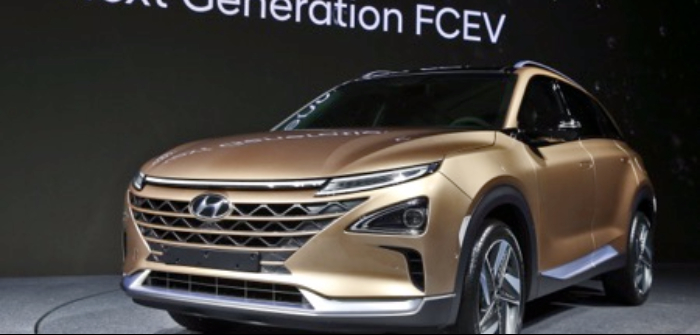Hyundai has announced details of a fourth-generation fuel cell which is set to be available next year.
The new technology was introduced at a special event held in Seoul, South Korea, earlier this week, where the company outlined plans to release 31 eco-friendly models by 2020.
Senior vice president of Hyundai’s Eco Technology Centre, Lee Ki-sang, spoke to the media in South Korea’s capital to highlight the company’s vision: “With uncompromised performance, our next-generation fuel cell SUV is the true epitome of an eco-friendly vehicle of the future.”
Since releasing the world’s first commercial production fuel cell vehicle in 2013, Hyundai has spent almost five years building on the original powertrain.
Developed with the focus of cell efficiency, performance, durability and storage density in mind, fuel cell performance has been significantly improved.
Thanks to reduced hydrogen consumption and component upgrades, the new fuel cell has an efficiency level of 60%, a 9% increase from the ix35 FCEV.
This means the new generation will target a driving range of 800km on a single charge. Hyundai has also boosted performance by 20% in comparison to its predecessor, delivering 163ps of power.
In addition to powertrain R&D, the South Korean company has made significant strides in hydrogen storage; a new tank layout, which includes three tanks of equal size, as well as innovations to the plastic liner configuration and layering pattern, means tank thickness has been reduced to achieve world-class gravimetric capacity.
To overcome issues with hydrogen fuel cell cold-start capability, the vehicle architecture has been optimized to allow key components to be incorporated into the stack, meaning the car can be started in temperatures of -30°C.
As well as development to Hyundai’s flagship fuel cell, the company’s latest SUV, which is due for release next year, will feature advanced driver assistance technologies.
Driven by global demand for fuel-efficient, eco-friendly vehicles, Hyundai is committed to a future vehicle line-up of electric, hybrid and fuel cell powertrain options paired with the further development of its transmission-mounted electrical device (TMED).
In a move that will see the company’s production of green vehicles accelerate, Lee Ki-sang is hoping the fourth-gen fuel cell represents the next step: “Hyundai will take the lead in developing and producing green energy vehicles that would ultimately complement a near-zero emission society.”


